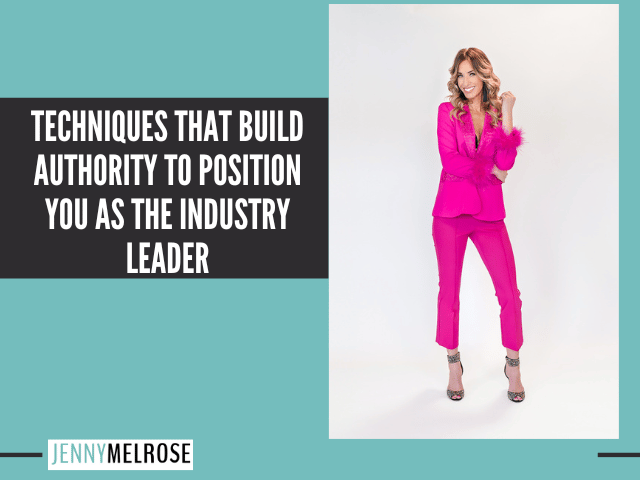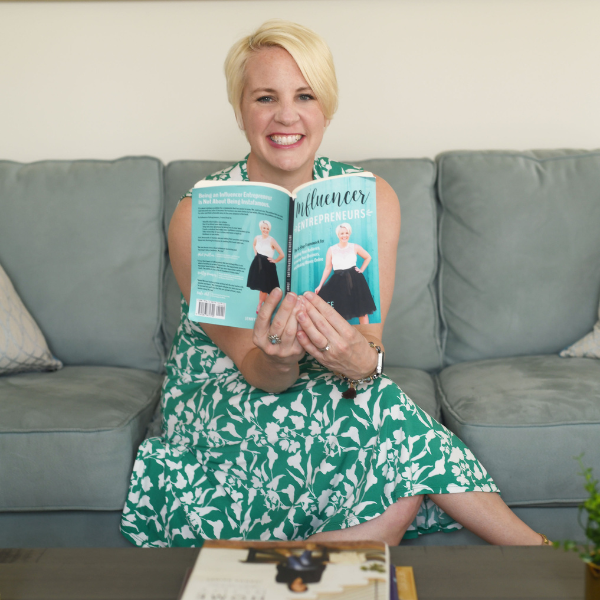Building authority in your industry helps create the “know, like, and trust” factor that sells your product or service. In this episode, we talk about the best techniques to position you as a leader in your industry and the importance of doing so.
IE 383: Techniques that Build Authority to Position You as the Industry Leader

Renée Warren is an award-winning entrepreneur, angel investor, speaker, author, and
founder of We Wild Women, an agency that helps women-led businesses build confidence and
position themselves as the authority in their industry by way of public relations, and gain industry recognition by landing the media exposure they deserve.
She has been in the industry for 12 years and knows that you have to be adaptive since it is changing. She thrives in writing killer pitches and pitch angles and creating procedures and processes.
She’s also the host of the celebrated podcast, Into the Wild, a show in the top 1.5% that features curated interviews with women entrepreneurs and provides actionable advice to women growing their dream businesses.
Renée firmly believes that the best advice comes from someone who has successfully done it before. Her approach to authority building and Public Relations comes from over 25 years of experience as an entrepreneur, in running marketing and PR agencies, and in being an unapologetic risk-taker.
When she’s not pitching the media or podcasting, you can find Renée spending time with her Irish Twin sons, crushing a CrossFit WOD, refining her drumming skills, or going on quarterly retreats with her husband Dan Martell.
What is authority?
To be the authority in your space is to be the person who creates the standard in an industry and who everyone turns to for advice on a particular subject. It is the person with who people feel connected and want to get more information.
It’s the level of trust and respect others have for your knowledge, expertise, and opinions.
- Who would be the best couple’s therapist?
- Who would be the best person to turn to about growing a blog (Jenny, of course!)?
- Who is the best person to hire to redecorate your office?
The way these people created their authority is through repetition and consistency. They talked about their content over and over again.
How do you build authority?
You build authority through what I call the Authority Arc: Rare + Reputation + Reach.
How are you rare? A diamond is rare. Renee uses the example of Charlie and the Chocolate Factory. Willy Wonka was so worried that someone would steal his recipe that he never allowed anyone to go in and tour the factory. When he wanted to generate more buzz about his chocolates, he created a cool contest that offered 6 gold wrappers or tickets that would allow people the chance to tour the chocolate factory. Those were coveted. Everyone wanted one because they were rare! People would go the extra mile to get the golden ticket.
There are three components of how you can be rare:
What is your unique positioning (USP)?
How are you different?
How are you unforgettable? Maybe it is the hero’s journey of rags to riches or you are a
breast cancer survivor that allowed you to become a beacon in the industry.
How are you unlike anyone else?
Renee has been on multiple podcasts that have had PR people but she shows up with a different energy and a different framework. She is unlike anyone else because her method of doing things and what she teaches is different.
How do you build your reputation?
Reputation is all about building trust. When you look at someone’s social media profile,
you can get a sense of if you like them because they exude trust.
Setting a standard is one element of reputation.
Nurturing relationships is the last part of building a reputation. This is key when it comes to PR.
One of Renee’s clients was featured in USA Today. That didn’t happen because she started nurturing the relationship yesterday. It happened because she nurtured the relationship over months if not years.
PR is a long-term approach. If you want immediate results, you run ads.
You cannot just start a blog and everyone comes. You have to be refining, tweaking, publishing, and following the framework and format.
How do you amplify your reach?
This part is more systematized. The first part is systems and processes.
When you think about amplifying your reach on social media, it is all about the type of content you share. What do you share? How often do you share?
Anyone who you see doing it successfully has a process behind the scenes that allows them to create killer content. In the blogging world, there is a formula that tells you how often and how long to do it successfully. When it comes to PR, you have to create that strategy.
You first need to understand your goal. Why are you doing it? If you want to be on a particular podcast or publication, it could take months. If you don’t understand that, you might give up too soon.
The last thing that is a part of reach is consistency. Consistency is your currency and it is your grit factor. You often want to give up but you cannot.
The people who have the grit factor keep showing up because they know they have an important message to share and a community that is relying on them. They count on your content. Even if they have never met you before, they feel like they know you.
When you can plug into the authority ARC formula (rare, reputation, reach), it is easier to create authority in your industry.
The overlap between pitching to sponsors and PR work is the positioning piece; trying to figure out how you are unique and then trying to make connections and collaborations.
What is the purpose of reaching out and trying to get PR?
The purpose of doing PR is to become a household name. It is one of the most trusted forms of marketing and media.
Ads work and you know within a few hours/days if they are working. With PR, you don’t know if it is working.
If you get mentioned in Forbes, Business Insider, or USA Today, you have credibility. If that publication is mentioning or quoting someone, they have to be real, have something smart to say, or have a good story.
This is leverage and it works together. For example, if you have a strong social media presence, that is leveraged to pitch the media and vice versa. The better your following, the more apt the media is to want to talk to you.
Once you are in the media, it builds credibility. It works together. Social media, content marketing, and PR work together to form the PR engine.
One of the reasons for this is the SEO factor. When you Google certain keywords, the best content is from notable publications. Seeing someone’s name mentioned adds credibility.
When Google sees that Forbes is connecting to the website, then that website gets “Google juice” for the website and helps the website rank. One of the only ways to connect those bigger websites to yours is through PR.
The backlinks that you get from those connections are more important than just being mentioned in an article. Those links help people find you and it takes time.
Then, people can join your email list and eventually, buy your product or service. If the site has a higher domain authority, it will give you more “Google juice” back to your website. While social media and blog posts are fleeting, this is stickier than anything else because the articles keep coming up.
You can use those PR mentions on your website, even if it was five years ago. Just be sure to link to those articles on your website to add credibility.
This can be compared to running a marathon. You don’t start with a many-mile marathon. You start with smaller ones and keep adding distance as it becomes easier.
This is the same with PR and pitching. You keep adding the fuel to keep the PR engine going. In the beginning, you may not see the wins because the pitches are just going out and the follow-ups are just happening. Eventually, the momentum starts.
The moment you land on your way and figure out your purpose, everything becomes easier.
What are the benefits of building authority?
-
- You become the go-to expert in your industry and people naturall turn to you for advice.
- When you share freebies on your website and useful content, that helps with the trust factor.
- You can then charge more for your speaking fees, as you’re in demand, and can land bigger deals/collaborations and bigger media wins.
- You can charge more for your products and services.
- Your reputation is the one tool that won’t be affected by the economy.
- If you’re listed as a top 10 expert, people pay attention.
- If the market looks at you as an expert, they will want to buy from you.
- You get paid more!
What are the biggest mistakes made when trying to build authority?
- People give up way too soon. It is important to follow up multiple times and create a cadence to do consistently. If you don’t hear back, you are still in the running. Be respectful and not annoying.
- They focus on too many things. Instead of talking about multiple topics, narrow it down to your content pillars. Niche down. When you are trying to do all the things, people don’t know what to expect from you. The more niche you are, the more you can charge.
- They aren’t consistent. People change direction too often. Allow yourself to say no to opportunities (summits, webinars, etc.) because too many different things muddy the water. Focus on your why.
Oftentimes, we launch new things because we haven’t given our ideas enough time to see if they have sticky power.
Most people don’t need to be taught; they need to be reminded. You often see ads that come up repeatedly. There will come a day when you need something and those ads will be what you think about.
If you are only promoting 1-2 things, it will be easier to get media coverage.
People have to see and hear something 7-8 times for people to notice it. You start noticing people on podcasts, in books, and other places and then you are interested in them and intrigued about what they have to say so then you buy from them.
Download Renee Warren’s Proven Email Pitch Strategies
It includes actual pitches that Renee has used to pitch for media coverage and the systems and processes to use to do your own PR.
When do you start?
Who do you pitch?
How do you do it?
It is a good foundation to get started with PR. Renee also has a do-it-yourself media kit.


